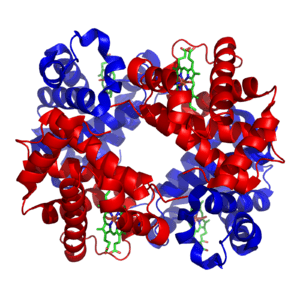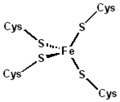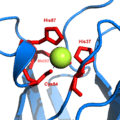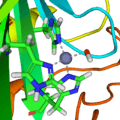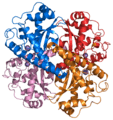Metalloprotein facts for kids
A metalloprotein is a special kind of protein that has a metal ion attached to it. Think of it like a tiny machine part that needs a specific metal to work. Many proteins in your body and in nature are metalloproteins.
It's amazing, but about half of all proteins need metals to do their jobs! These metals help proteins carry out many important tasks inside cells. For example, some metalloproteins act like tiny enzymes that speed up chemical reactions. Others help transport things, like oxygen in your blood, or store important substances. Some even help cells send signals to each other.
Contents
What are Metalloproteins?
Metalloproteins are proteins that contain a metal cofactor. A cofactor is like a helper molecule that a protein needs to work properly. In this case, the helper is a metal atom. These metal atoms are often ions, meaning they have an electric charge.
Why Metals are Important for Proteins
Metals play a super important role in how these proteins work. They can help the protein:
- Hold its shape: The metal can act like a tiny scaffold, helping the protein keep its correct 3D shape.
- Do its job: Many times, the metal is directly involved in the chemical reaction the protein performs. For example, it might help transfer electrons or bind to other molecules.
Scientists believe that about one-quarter to one-third of all proteins need metals to do their jobs. This shows how crucial these metal helpers are for life!
Jobs of Metalloproteins
Metalloproteins have many different jobs in living things. Here are a few examples:
Enzymes that Speed Up Reactions
Many enzymes are metalloproteins. Enzymes are like tiny biological machines that speed up chemical reactions in your body. For example, an enzyme called carbonic anhydrase uses zinc to help your body manage carbon dioxide.
Transport and Storage Proteins
Some metalloproteins are like delivery trucks or storage units.
- Hemoglobin: This famous protein in your blood uses iron to carry oxygen from your lungs to all parts of your body. Without iron, your blood couldn't carry enough oxygen.
- Ferritin: This protein stores iron safely inside your cells.
Sending Signals
Metalloproteins can also help cells communicate with each other. They are involved in signal transduction, which is how cells receive and respond to messages. For example, some proteins use calcium ions to help send signals inside cells.
Images for kids
-
Zinc finger. The zinc ion (green) is coordinated by two histidine residues and two cysteine residues.
See also
 In Spanish: Metaloproteína para niños
In Spanish: Metaloproteína para niños
 | Ernest Everett Just |
 | Mary Jackson |
 | Emmett Chappelle |
 | Marie Maynard Daly |


